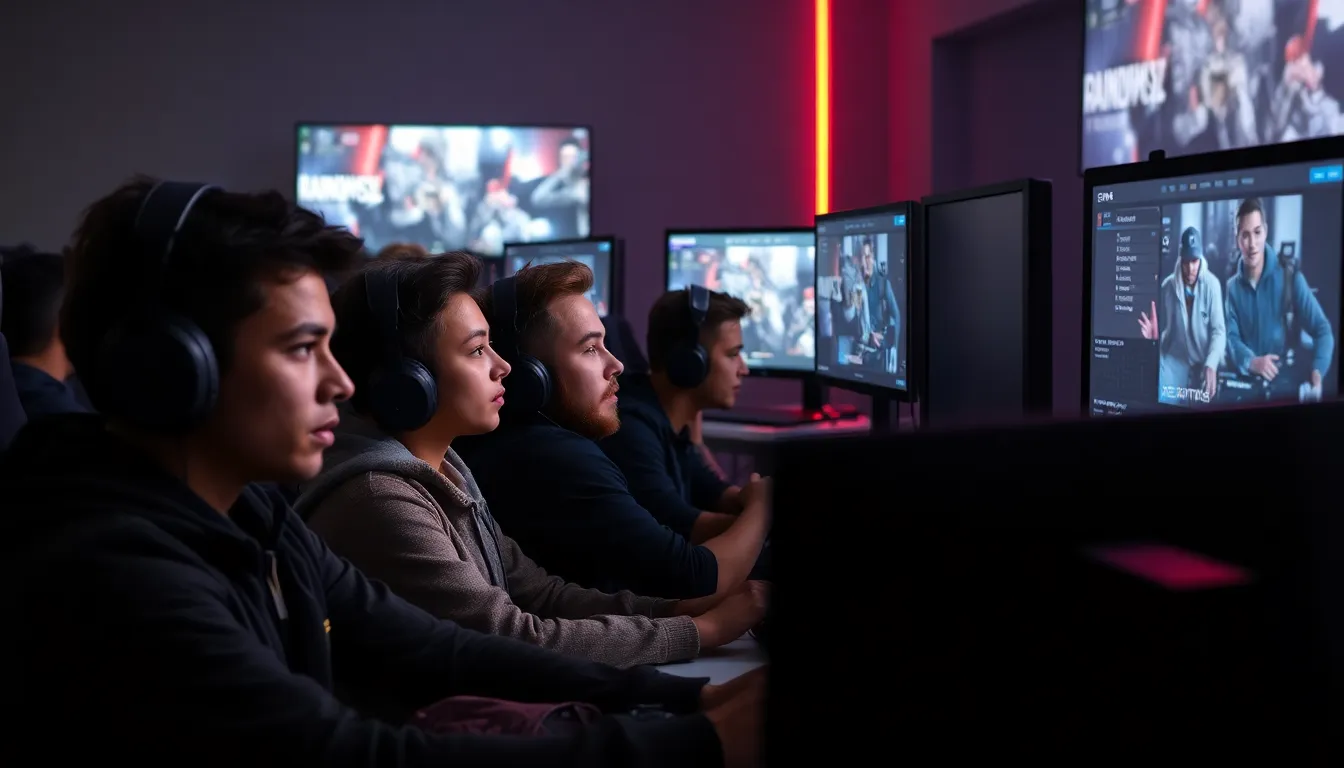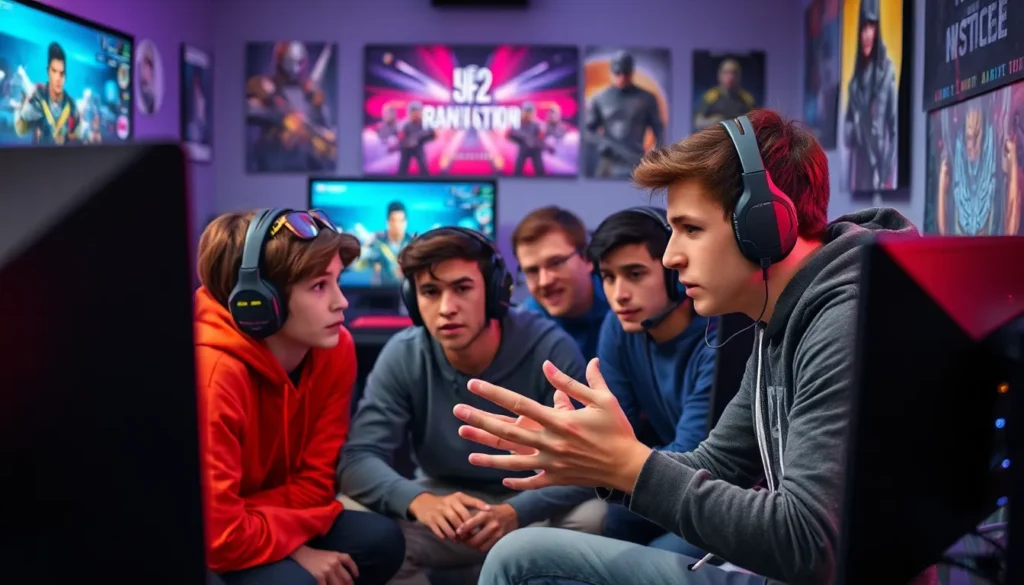Table of Contents
ToggleIn the intense world of Rainbow Six Siege, teamwork isn’t just a bonus—it’s the secret sauce that turns a good squad into a legendary one. Imagine trying to defuse a bomb while your teammates are busy arguing over who gets the last slice of pizza. Not exactly the dream team, right? Effective coordination can mean the difference between victory and a quick trip back to the lobby.
Mastering teamwork in R6S requires more than just knowing the maps or having the best gadgets. It’s about syncing up with your squad like a well-rehearsed dance routine—minus the sequins and glitter. From strategic communication to clever role assignments, successful coordination can elevate gameplay and keep the enemy guessing. Buckle up as we dive into the art of teamwork that’ll have your squad dominating the battlefield and laughing all the way to the victory screen.
Understanding R6S Teamwork Coordination
In Rainbow Six Siege, teamwork coordination elevates performance from average to exceptional. Effective communication and understanding among team members define success.
Importance of Teamwork in R6S
Teamwork stands as a key factor in achieving victory. Synchronized efforts in strategy, positioning, and execution enhance gameplay. Players who collaborate effectively can adapt to dynamic situations. Coordinated actions provide advantages, such as flanking enemies or securing objectives swiftly. Conflicts over minor issues can distract teams, while unity centers focus on the mission. Strong teamwork fosters trust, enabling players to rely on one another during critical moments.
Key Elements of Effective Coordination
Effective coordination relies on several key elements. Clear communication signifies one of the most vital aspects. Players should share crucial information about enemy positions and tactics. Defined roles help establish responsibilities within the team. Each player’s unique skills contribute to overall success. Utilizing game mechanics, such as drones and cameras, enhances situational awareness. Regular practice cultivates teamwork, allowing squads to refine strategies and improve synergy. Emphasizing these elements creates a cohesive and formidable unit.
Communication Strategies for Success

Effective communication drives teamwork success in Rainbow Six Siege. Utilizing varied strategies enhances coordination and overall performance.
Voice Chat vs. Text Communication
Voice chat streamlines quick exchanges during intense gameplay. Players can relay crucial information faster, enabling real-time decision-making. Text communication often leads to delayed responses or missed messages. On the other hand, it serves as an alternative when voice chat isn’t available or convenient. Given the fast-paced nature of the game, prioritizing voice chat allows teams to react swiftly to threats or changes. Players should choose their preferred method based on team dynamics and individual preferences.
Situational Awareness and Callouts
Situational awareness hinges on clear and concise callouts. Players must provide details about enemy locations or shifts in strategy effectively. Specific terms help convey vital information rapidly during gameplay. For example, identifying an enemy by name or location enhances teamwork and response times. Additionally, using established jargon fosters quicker understanding among teammates. Keeping callouts short prevents clutter in communication, allowing for focused conversations. Players should integrate callouts into practice sessions to reinforce effectiveness and speed during matches.
Roles and Responsibilities in R6S
Team roles and responsibilities in Rainbow Six Siege significantly influence overall performance. Each player’s understanding of their function facilitates smoother gameplay.
Understanding Each Operator’s Strengths
Operators in R6S possess distinct abilities. Attackers excel in breaching defenses, while defenders fortify and control zones. Each operator’s unique skill set contributes to the team’s strategy. For instance, operators like Ash provide speed, which can facilitate rapid entry, while players using Mira can create defensive advantages with her black mirrors. Recognizing these strengths allows teammates to leverage their capabilities effectively.
Balancing Offensive and Defensive Roles
Teams gain an advantage by maintaining a balance between offensive and defensive roles. Offensive players initiate attacks to disrupt opponents, whereas defenders focus on maintaining control of objectives. Each team should ideally consist of an even mix of both roles to respond dynamically to different situations. An attacker might breach a wall, while a defender secures sightlines. This balance creates opportunities for effective strategies, allowing teams to adapt and execute their plans seamlessly.
Strategies for Improving Team Coordination
Effective team coordination relies on thorough planning and the ability to adjust tactics during matches. Implementing strategies boosts overall performance in Rainbow Six Siege.
Pre-Match Planning and Strategies
Planning before a match creates a strong foundation. Teams should discuss operator selections based on map layouts and opposing team strategies. Setting clear objectives for rounds significantly enhances focus. Understanding each player’s strengths allows assignments tailored to complement each role. By mapping out potential tactics, teams prepare for various scenarios they might encounter. Utilizing tools like diagrams or strategy boards effectively illustrates these plans and boosts clarity. A shared vision before gameplay keeps everyone aligned toward the same goals.
In-Game Adaptability and Flexibility
Adaptability boosts a team’s effectiveness during matches. They must respond quickly to changing dynamics, whether opponents use unexpected tactics or players get eliminated early. Flexibility in strategy allows for quick adjustments, such as repositioning operators or changing roles mid-game. Communication remains crucial, enabling quick callouts about enemy movements and immediate adjustments. Teams excel when they embrace fluidity in their tactics. Innovating in response to the game’s flow creates opportunities for surprise attacks or defensive maneuvers. Emphasizing collective awareness of the battlefield enhances success rates and ultimately leads to victory.
Overcoming Common Challenges
Teamwork in Rainbow Six Siege faces several hurdles that require resolution for optimal performance. Navigating these challenges can significantly enhance coordination and gameplay.
Dealing with Toxicity and Conflicts
Toxicity among teammates disrupts cooperation. Squads often experience heated arguments over strategies or decisions made during gameplay. Focusing on constructive criticism fosters a healthier environment. Setting clear ground rules for communication prevents misunderstandings. Recognizing the value of each player’s contributions encourages respect and patience. For instance, using a dedicated voice chat strategy can reduce frustration. This method ensures conversations remain focused on in-game objectives. Teams that practice empathy and understanding tend to overcome conflicts more effectively.
Handling Different Skill Levels Among Players
Skill level disparities can strain team dynamics. Balancing experienced players with newcomers promotes inclusivity and learning. Encouraging seasoned players to mentor less experienced teammates enhances overall team performance. Teams should assign roles based on individual strengths while accounting for varying skill levels. For example, assigning a more skilled player to lead strategies can help guide others. Providing resources and materials for improving gameplay allows everyone to grow. Adapting strategies that cater to each player’s capabilities ensures everyone contributes effectively, resulting in a more cohesive unit.
Teamwork in Rainbow Six Siege is more than just a strategy; it’s the backbone of success. When players coordinate effectively they create an environment where each member can shine. Clear communication and defined roles not only enhance gameplay but also foster a sense of unity that drives teams toward victory.
As players refine their skills and embrace adaptability they unlock new levels of performance. Overcoming challenges like toxicity and skill disparities is achievable through empathy and mentorship. By prioritizing teamwork and fostering a supportive atmosphere teams can elevate their gameplay and consistently achieve their objectives. In the world of R6S teamwork truly transforms the game.




